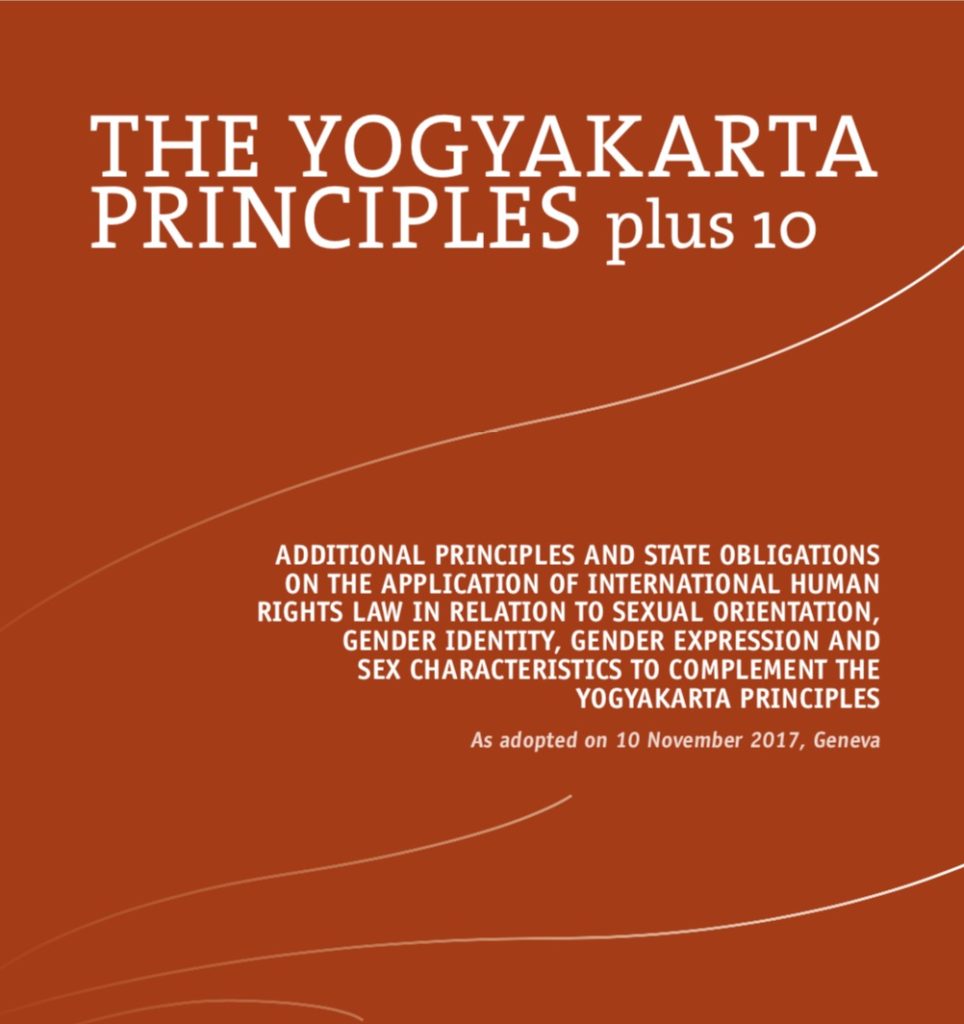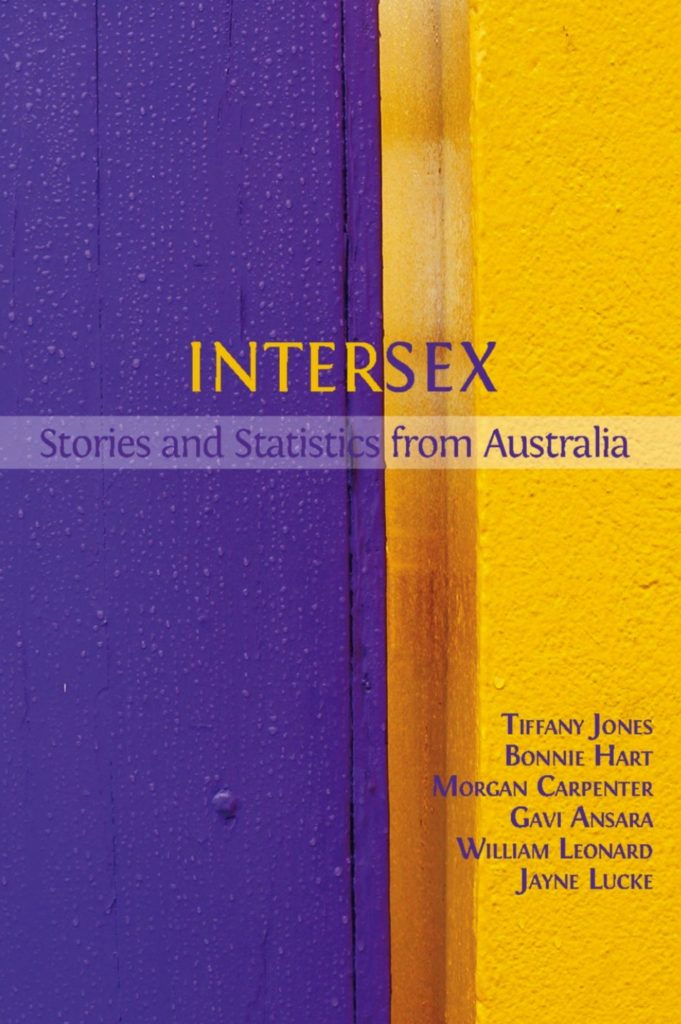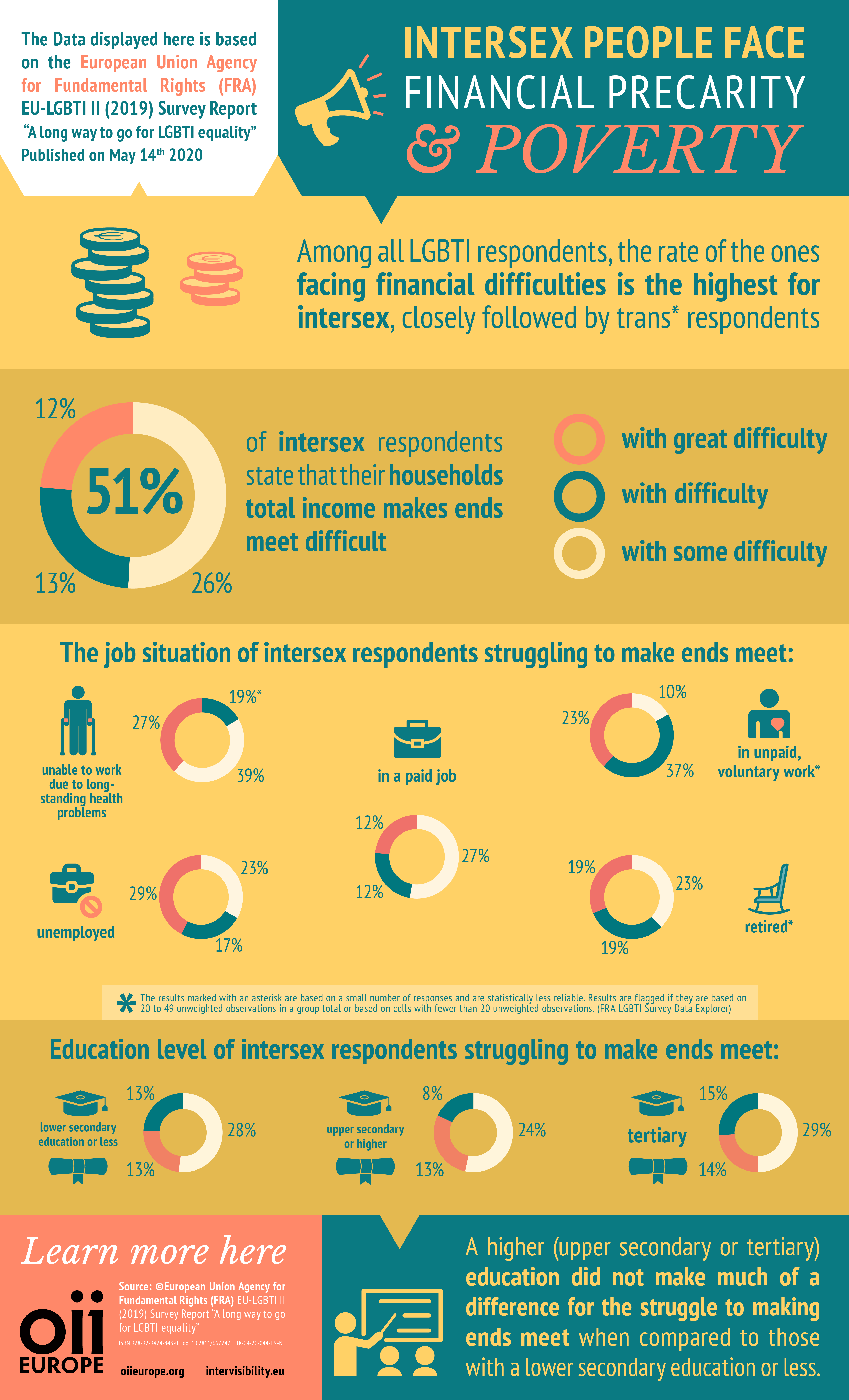For the first time, the FRA LGBTI Survey 2019 shows us statistical data on the issues of housing and economic difficulties for intersex people living in Europe. Among all LGBTI respondents intersex people are the group with the highest rates of difficulties.
In addition, as pointed out in the editorial comment in our infographic, intersex people that were, at the time, experiencing housing issues, especially those with severe difficulties, may not have been reached by the survey.
Due to discrimination, marginalisation and social stigma, intersex people are disproportionately affected by difficulties in making ends meet and housing in the EU. However, Article 34(3) of the EU Charter of Fundamental Rights states that “in order to combat social exclusion and poverty, the Union recognises and respects the right to social and housing assistance so as to ensure a decent existence for all those who lack sufficient resources”.
We envision a future in which all people, including intersex people, are free from poverty, exclusion and have the possibility and space to thrive.
This is why we call on Member States to take all necessary legislative, administrative, budgetary and other measures, including economic policies, to:
- Ensure equal access, without discrimination on the basis of sex characteristics, to social security and other social protection measures
- Provide security of tenure and access to affordable, habitable, accessible, culturally appropriate and safe housing, including shelters and other emergency accommodation, without discrimination on the basis of sex characteristics
- Ensure the progressive reduction and elimination of all forms of poverty associated with or exacerbated by sex characteristics;
- Promote social and economic inclusion of persons marginalised on the basis of sex characteristics.
See The Yogyakarta Principles, 2006, as complemented by The Yogyakarta Principles plus 10, 2017 which added explicit reference to the sex characteristics, Principles 13, 14, 15 and 34

Please also check the Australian intersex peer-reviewed survey from 2015, that, for the first time, provided information on the income and housing situation of intersex people.

If you want to learn more about intersex human rights violations, please visit our website and check out the Resources-section on our website
We created infographics about some of the issues intersex people in Europe face. You can find the link for the infographics on housing and economic difficulties here:


Text contained in Infographic “Housing Difficulties” follows here:
29% of intersex respondents living in Europe experienced housing difficulties, the highest rate among all LGBTI respondents:
20% had to stay with friend or relatives temporarily
6% had to stay in emergency or temporary accommodation
8% had to stay in a place not intended as a permanent home
5% had to ‘sleep rough’ or sleep in a public space
41% stated relationship or family problems as reason for the housing difficulties, followed by 37% due to financial problems / insufficient income.
51% of those intersex respondents living in the countryside stated they faced housing difficulties, 21% of those had to “sleep rough” or in a public space.*
54% of those intersex respondents that were unable to work due to long-standing health problems stated they faced housing difficulties, 16% of those had to “sleep rough” or in a public space. The reason for these housing difficulties in this category were 49% due to financial problems / insufficient income followed by 41% due to relationship or family problems.*
The mean duration of the housing difficulties experienced by intersex people lies by 12.4 months, so a bit over a year.
Some details by Country:
Among the intersex respondents experiencing housing difficulties in IRELAND, 19% had to “sleep rough” or in a public space, followed by 15% of those living in the UK, 9% living in SERBIA, and each 7% of those living in the NETHERLANDS and in AUSTRIA.*
* The results of this category is based on a small number of responses and are statistically less reliable. Results are flagged if they are based on 20 to 49 unweighted observations in a group total or based on cells with fewer than 20 unweighted observations. (FRA LGBTI Survey Data Explorer)
Editorial comment: Intersex people that were, at the time, experiencing housing issues, especially those with severe difficulties, may not have been reached by the survey.
Text contained in Infographic “Economic Difficulties” follows here:
Intersex people in Europe face Financial Precarity & Poverty
In our newest infographic we would like to highlight the issues of economic difficulties of intersex households to make ends meet. The FRA LGBTI Survey 2019 statistical data shows us, that among all LGBTI respondents, the rate of the ones facing financial difficulties is the highest for intersex, closely followed by trans* respondents.
51% of intersex respondents state that their households total income makes ends meet difficult, 26% with some difficulty, 13% with difficulty and 12% with great difficulty.
The job situation of intersex respondents struggling to make ends meet:
- unable to work due to long-standing health problems (39% with some difficulty, 19%* with difficulty and 27% with great difficulty)
- in a paid job (27% with some difficulty, 12% with difficulty and 12% with great difficulty)
- unemployed (23% with some difficulty, 17% with difficulty and 29% with great difficulty)
- in unpaid, voluntary work* (10% with some difficulty, 37% with difficulty and 23% with great difficulty)
- retired* (23% with some difficulty, 19% with difficulty and 19% with great difficulty)
Education level of intersex respondents struggling to make ends meet:
- A lower secondary education or less (28% with some difficulty, 13% with difficulty and 13% with great difficulty)
- Upper secondary or higher education (24% with some difficulty, 8% with difficulty and 13% with great difficulty)
- tertiary education (29% with some difficulty, 15% with difficulty and 14% with great difficulty)
A higher (upper secondary or tertiary) education did not make much of a difference for the struggle to making ends meet when compared to those with a lower secondary education or less.
(*) The results marked with an asterisk are based on a small number of responses and are statistically less reliable. Results are flagged if they are based on 20 to 49 unweighted observations in a group total or based on cells with fewer than 20 unweighted observations. (FRA LGBTI Survey Data Explorer)
Learn more here:
https://www.oiieurope.org (this page)
https://www.intervisibility.eu
Source of Data displayed: ©European Union Agency for Fundamental Rights (FRA) LGBTI Survey Data Explorer & EU-LGBTI II (2019) Survey Report “A long way to go for LGBTI equality”
ISBN 978-92-9474-843-0 • doi:10.2811/667747 • TK-04-20-044-EN-N
Page updated: 11.01.2023


